Exposed: big tobacco’s financial links to vape research
Philip Morris funded research into vapes and e-cigarettes that had positive findings and have since been promoted by Australian researchers.

One of the world’s largest tobacco companies funded research that produced positive findings about vapes and e-cigarettes that have been used by Australian researchers and published in an Australian academic journal.
An investigation by The Australian has exposed how Philip Morris infiltrated academia through the Foundation for a Smoke Free World, which launched four years after the tobacco giant announced it would move into the e-cigarette market. One Italian researcher, who made a submission in support of vaping to the federal inquiry into e-cigarette use in Australia, has worked on at least 17 papers commissioned by the foundation.
Philip Morris – the maker of Marlboro and Peter Jackson cigarettes – is the sole funder of the Foundation for a Smoke Free World. It has financed more than 70 academic papers on topics including e-cigarettes, heated tobacco products and rates of smoking cessation since it launched in 2017 with an annual funding pledge of $80m.
The research, some of which does not disclose the foundation is funded by the tobacco company, is published in legitimate academic journals including titles produced by internationally respected publishers such as Oxford University Press, Springer, Wiley and SAGE. The foundation has commissioned at least six projects with researchers from Yale University.

After the research is published, it is then cited by other researchers and becomes part of academic literature. Some of the articles have been cited dozens of times, with that research then relied on by other researchers, sometimes hundreds of them and occasionally thousands.
One paper on patterns of tobacco use over the pandemic published in Nicotine and Tobacco Research, which is run by Oxford University Press, was cited 82 times. Those 82 research papers were cited more than a 1000 times. That research was then used in more than 6700 papers. The original paper did not disclose the link to Philip Morris but disclosed funding from the foundation. Oxford University Press did not respond to a request for comment.
Another paper, a review of studies on the health impact of e-cigarettes, was referenced 13 times in other researchers’ work. That research was then cited 104 times and those papers were then cited more than 3800 times.
Stanford University professor Robert N. Proctor has written multiple books about the tobacco industry and coined the term “agnotology”, the science of ignorance and creation of disinformation.
Professor Proctor said cigarette makers liked supporting science when it helped them sell cigarettes. “Cigarette makers also support science to make it seem like they are acting as responsible corporate citizens,” he said.
“Funding also create allies in the scientific community, allies that may help them with regulatory matters or even to serve as witnesses in court.”
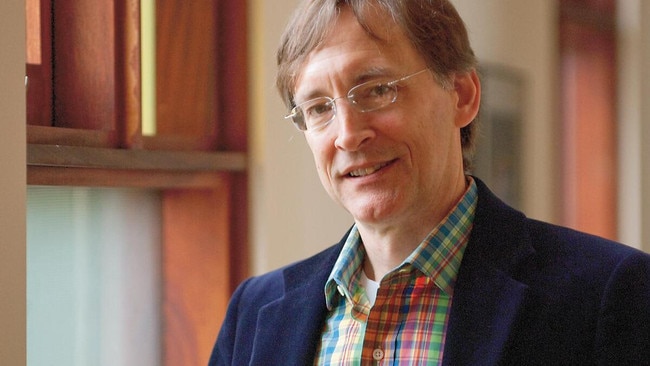
The Council of Academic Public Health Institutions Australasia, the Public Health Association of Australia and a group of Australian researchers vowed not to accept the foundation’s money or work with it on any project after it launched in 2017.
One of the researchers, longtime anti-smoking campaigner and Curtin University emeritus professor Mike Daube, said the foundation’s research funding was a cynical way to mislead the scientific community and readers may not be aware a cited paper was tobacco-funded.
“It’s just amazing that close to 75 years after we learned that smoking is lethal, companies like Philip Morris are still trying to con the community into thinking that they care about health,” he said.
“Funding of this kind hits multiple targets for Philip Morris and the tobacco industry. They set (and distort) the research agenda. They seek to create conflicts in the scientific arena. Their funded researchers participate in widely publicised conferences.
“Research funded through the FSFW is presented and published without any reference to the Philip Morris funding.”
At least two papers on e-cigarettes authored by Australians have used research commissioned by the Foundation for a Smoke Free World. One, a review of international evidence of e-cigarettes and health outcomes, was authored by pro-vaping advocates Colin Mendelsohn and Alex Wodak.
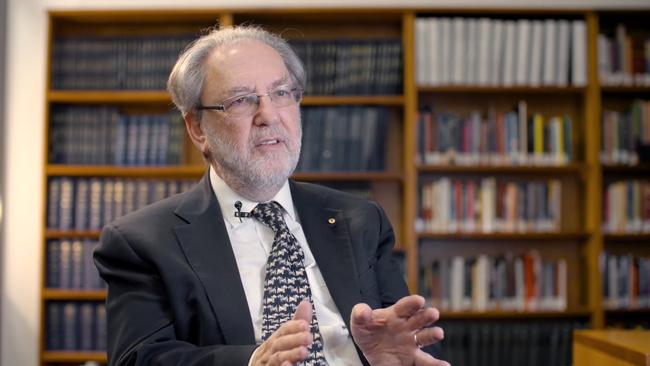
Dr Mendelsohn, Australian Tobacco Harm Reduction Association founding chairman, said the study was high quality, peer reviewed and accepted for publication. “This was one reference out of 54, which was simply replicating previous research,” he said. “The findings were compatible with other research cited and were not controversial.”
The Australian is not suggesting Dr Mendelsohn or Dr Wodak received funding from the foundation for their paper, just that they used research commissioned by the foundation.
The original paper, which found vapour had less of a respiratory and cardiovascular impact than smoke, discloses funding from the foundation and Philip Morris.
The other paper that cites foundation-linked research is on psychiatry and e-cigarette availability. It was published in the Australian & New Zealand Journal of Psychiatry. The paper asks the Royal Australian and New Zealand College of Psychiatrists to review its support for e-cigarettes amid rising use among young people.
At least one Australian publication has published foundation-funded research. Acoustics Australia, which is distributed by publisher Springer, published a study on collecting evidence of the harm of tobacco smoke on the voice. The paper disclosed funding from the foundation, but not Philip Morris.
Acoustics Australia editor Marion Burgess, a UNSW associate professor, said editorial policies were followed in the publication of the paper. “As required, sources of funding for the research reported were declared,” she said.
Tobacco kills more than eight million people each year, according to the World Health Organisation. A review by the widely respected British policy institute Cochrane found rates of quitting smoking were higher when people used vapes and e-cigarettes than when they used nicotine replacement therapies such as patches.
Professor Ricardo Polosa is listed as an author on at least 17 papers with funding from the foundation. He made a submission in favour of vaping to the Australian government inquiry into e-cigarettes in 2018. “Allowing nicotine in vaporised form in a wide palette of flavours makes vaping a stronger competitor with smoking,” Professor Polosa, who is based at the University of Catania in Italy, told the inquiry.
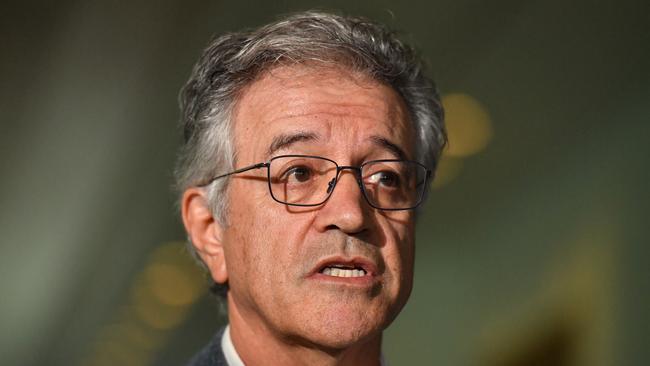
Professor Polosa is also the founder of Italian-based global research body CoEHAR and is a prolific and widely respected author on respiratory health.
A CoEHAR spokeswoman said Professor Polosa was asked by Australian politicians to make a submission. “Professor Riccardo Polosa was attending the [The Australia and New Zealand Society of Respiratory Science] annual conference in Canberra and he made contact with Australian politicians,” she said. “They asked him to contribute to the dialogue with a submission.”
The spokeswoman said academic staff had found the foundation online. “We have published more than 100 scientific publications in the most prestigious and authoritative journals in the world in recent years,” she said. “Our scientific independence is recognised.”
When the Foundation for a Smoke Free World was launched, the WHO disavowed the research body. The WHO said harm reduction should not be funded by tobacco companies due to the industry’s long history of misleading the public over the harms of smoking.
“When it comes to the Foundation for a Smoke-Free World, there are a number of clear conflicts of interest involved with a tobacco company funding a purported health foundation, particularly if it promotes sale of tobacco and other products found in that company’s brand portfolio,” the WHO said.
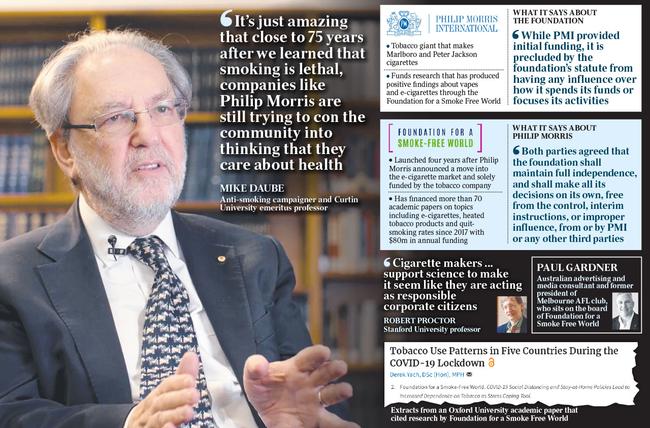
Philip Morris announced it would move into the e-cigarette market in 2013 and in 2015 began researching and developing cigarette alternatives with Altria, which claims to be the largest tobacco company in the US.
Philip Morris launched the now discontinued vape the IQOS Mesh in London in 2016 and started selling the IQOS VEEV vape in New Zealand in September 2020.
The foundation has commissioned two research projects examining smoking cessation in Australia, one of which remains active, as part of a study of five countries by the US-based BOTEC Analysis.
The paper found Australians trying to quit smoking might benefit from vapes and that the available data refuted that vapes could act as a gateway to smoking. “Quitting smoking is the primary reason cited by Australians for beginning to use e-cigarettes in the first place,” said the study.
“In this respect, then, the gateway theory does not appear to ring true, insofar as 98 per cent of smokers aged 12 years or older reported having smoked combustible cigarettes prior to using e-cigarettes.”
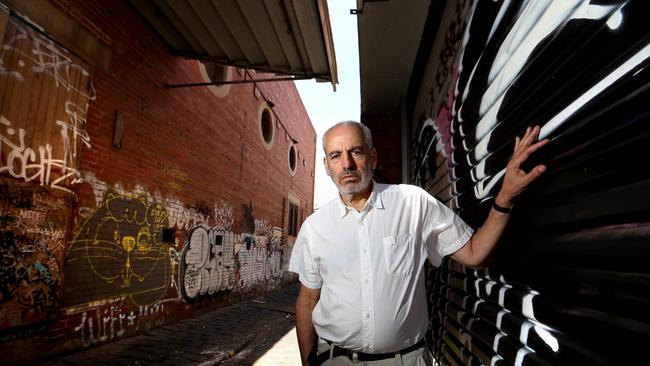
BOTEC managing director Sam Hampsher said Australia was chosen because of its track record in reducing smoking rates and its unique approach to e-cigarette regulation. “The foundation had no involvement in our research design, target selection, data analysis or any other part of our work product,” he said.
Vapes containing nicotine can be purchased from convenience stores despite laws introduced by the Coalition in October 2021 that require customers to have a prescription. Public health groups are advocating stronger restrictions.
On the foundation’s board is Australian advertising and media consultant Paul Gardner, also a former president of the Melbourne Football Club. Mr Gardner, a non-executive board member, also chairs the foundation’s governance and compensation sub-committee and sits on the executive committee, according to his LinkedIn page. Mr Gardner referred The Australian’s request for comment to the foundation.
A spokeswoman said the foundation operated independently of Philip Morris and grant applications went through an independent peer-review process with no involvement from the tobacco industry.
“Our independence from PMI and any commercial entity is established in our organisational documents, including the bylaws,” she said. “In the pledge agreement that the foundation entered into with PMI, both parties agreed that the foundation shall maintain full independence, and shall make all its decisions on its own, free from the control, interim instructions, or improper influence, from or by PMI or any other third parties. These statements are not just written on paper, but they are the lived experience of the organisation.”
A Philip Morris spokesman said the foundation was an independent organisation. “While PMI provided initial funding, it is precluded by the foundation’s statute from having any influence over how it spends its funds or focuses its activities,” he said. “Questions on its research priorities are best put to the foundation.”








To join the conversation, please log in. Don't have an account? Register
Join the conversation, you are commenting as Logout